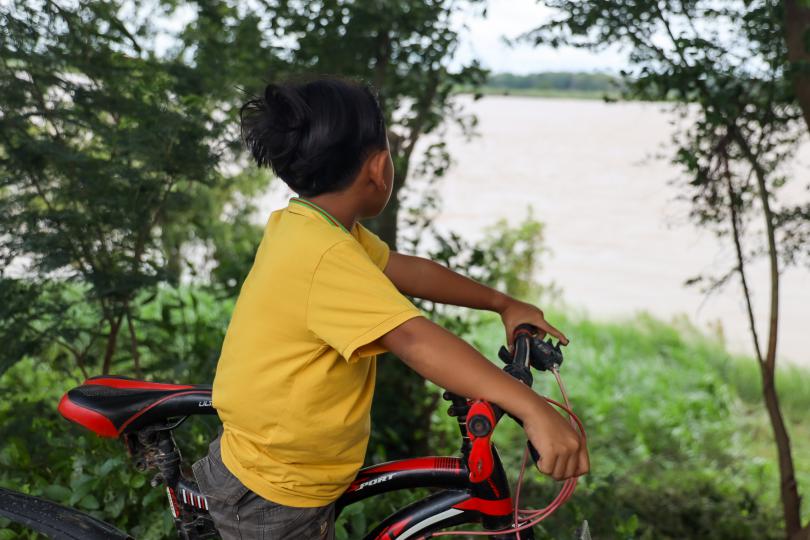The Impact of SOGIESC Education on Promoting Acceptance

Chhun*, a student at a local school, shared his experience of feeling dissatisfied and discriminated against due to his gender expression. He was often labelled as "Kteuy" (Kteuy literally means "third sex" which is considered an offensive word to refer to "transgender people") by his peers, leading to exclusion from school activities such as group work and sports teams.
Chhun comes from a family with a moderate income, with both parents working yet able to spend quality time at home with him and his younger two-year-old sister.
Despite being a hardworking student who consistently ranked at the top of his class, Chhun faced frequent derogatory remarks and social exclusion. These experiences led to feelings of sadness, isolation, and depression.
“I felt upset and wanted to cry but tried to hold back. Sometimes, it made me feel depressed. I did something else for fun,” Chhun said. “Sometimes, I sat alone in class. I drew and painted animals. I did not know why they chased me away. They said I was different. They did not like me. I often played alone and was upset.”
Chhun chose not to inform his parents about the discrimination he faced, worrying they might not understand or that he would add to their burdens. This lack of communication left him without crucial support, intensifying his isolation.
“I didn't inform my parents because they were busy, and I did not want to cause them more problems,” Chhun said. “When I got home, I sat alone, wrote my lessons, and slept to ease my sadness.”

The turning point came when Chhun’s school, with the support of the Promoting the protection and inclusion of children discriminated due to their sexual orientation and gender identity/expression (SOGIESC) in Cambodia – Phase II project, began mainstreaming knowledge regarding the rights of children with diverse SOGIESC in June 2023.
The project is being implemented by Save the Children Cambodia in collaboration with Child Rights Coalition Cambodia (CRC - Cambodia) and Cambodia Children and Young People Movement for Child Rights (CCYMCR) and is funded by the Norwegian Organization for Sexual and Gender Diversity (FRI) through Save the Children Norway (Redd Barna).
The project provided comprehensive training on SOGIESC to various stakeholders, including the School Management Committee (SMC), teachers, and students from 43 primary schools in Kampong Cham province. The training, integrated into the Child Protection and Gender Inclusion Training Manual, reached 66 SMC members (29 women) and 207 Student Council members (134 girls).
Additionally, specific sessions were conducted for teachers and SMCs from multiple primary schools to build their confidence in promoting child protection and gender equality, aligned with relevant policies and laws. Students from 10 selected pilot schools also received training on SOGIESC, child protection, and campaign tools, significantly improving their understanding of child rights and anti-discrimination measures. The project also financially supported child-led campaigns and conducted quarterly reflection meetings to incorporate equality and acceptance of children with diverse SOGIESC into school guidelines.
During this period, Chhun courageously reported his experiences to a trusted teacher, Ms. Namrong. “I reported to my teacher that a few fourth graders called me ‘Kteuy.’ My teacher explained to them to stop using this word to me,” Chhun said.
Ms. Namrong said she addressed the issue by discussing the harmful impact of such language and behaviour with the students involved, adding that the school also used morning flag salute assemblies, meetings, and discussions as platforms to reinforce the message of acceptance and non-discrimination.
“In the past, many students used to label each other for fun, sometimes leading to arguments and fights. Since the project was introduced, both teachers and students have better understanding and learned about different forms of violence and discrimination, the incidents have reduced,” she said. “I can tell that Chhun is a very patient student and often keeps things to himself. I have encouraged him to speak out if he encounters such treatment.”
With increased awareness and support from the school, Chhun experienced a significant reduction in discriminatory behaviour from his peers. He became more included in school activities and felt a growing sense of belonging.
Chhun’s new classmate, Sreypich, enjoys spending time with Chhun and two other female friends. She dislikes those who bullied Chhun with inappropriate names and mocking behaviours.
“I always tell Chhun to ignore those students and report to our teachers because this is discrimination. Chhun is a good friend and good student to me,” Sreypich said.
In a recent interview with Chhun’s father, Mr. Senghong, has expressed remorse for what his child had previously experienced, noting that his love for his child is huge and he respects Chhun’s future decision regarding his gender expression.
“I think my child is mature. He always shares his achievements and leadership roles at school with us and makes us proud of what he has done,” he said. “He had never let us know how other students treated him.”
Chhun's experience proves it is vital to address discrimination and promote inclusivity at school to create a more inclusive, supportive, and respectful school environment for all students.
“Now, no one discriminates against me and chases me away. I enjoy playing with my friends. I want to further my studies, keep our school violence-free, and care for each other among friends,” Chhun said.
Chhun also shares his team of becoming a doctor to provide knowledge and serve his community after noticing the unhealthy lifestyles of the community members, aiming to make a positive impact.
* The beneficiary’s name has been changed to protect the identity.
Interviewed by: Chea Sokhalay, Project Officer
Written by: Taing Vida - Communications and Campaign Specialist
Proofread by: Chin Kethya, Donor Reporting Specialist
Photography: Yous Ratha, Communications Officer



